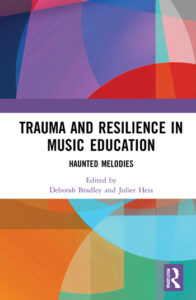
Trauma and Resilience in Music Education: Haunted Melodies explores how music provides a means to work through traumatic experiences and examines the role music education can play.Trauma and Resilience in Music Education: Haunted Melodies explores how music provides a means to work through traumatic experiences and examines the role music education can play.
Trauma is ubiquitous in today’s world and affects more people than it leaves untouched. Teachers have become increasingly sensitized to societal and personal trauma as they seek ways to address the impact within their classrooms.
Juliet Hess, an associate professor of music education in the Michigan State University College of Music, considers the effects of trauma on teachers and students in the music classroom. Her recent book Trauma and Resilience in Music Education: Haunted Melodies explores how music provides a means to work through traumatic experiences and examines the role music education can play. Co-edited by Deborah Bradley, retired from the University of Wisconsin—Madison, the book curates essays from a dozen music educators and scholars who reflect on the effects of trauma, and how music might foster resilience for individuals and groups.
“Many tools for fostering resilience occur quite naturally in music class,” said Hess. “In addition, many types of music have emerged from traumatic or oppressive context. Considering trauma alongside the resilience of a particular group of people can be something we do in music class.”
Hess remarks that music distinguishes itself from other subjects through its potential to provide clues to the recovery of traumatic memory, and to act as a tool for releasing emotions and calming stresses. Her co-edited book discusses how music can support people of all ages to process traumatic experiences.
Trauma and Resilience in Music Education serves as a vital resource for music educators and researchers, and lays a foundation for how trauma-informed education practices can guide music educators. Essays are grouped into sections that contain theoretical perspectives for educators, essays on personal trauma and grief, and examination of societal trauma levied through racism and various forms of oppression.

In her new book, Juliet Hess, an associate professor of music education in the Michigan State University College of Music, considers the effects of trauma on teachers and students in the music classroom.
“Our hope is that this book provides some different entry points for music educators who want to support students who have experienced trauma, as well as support themselves,” she said. “Given the trauma and loss that many of us have faced during the pandemic, which has disproportionately affected communities of color, it is likely that both teachers and students are having to teach and learn through trauma.”
To order or for more information on Trauma and Resilience in Music Education: Haunted Melodies co-edited by Deborah Bradley and Juliet Hess, visit the Routledge Taylor and Francis Group Site.



